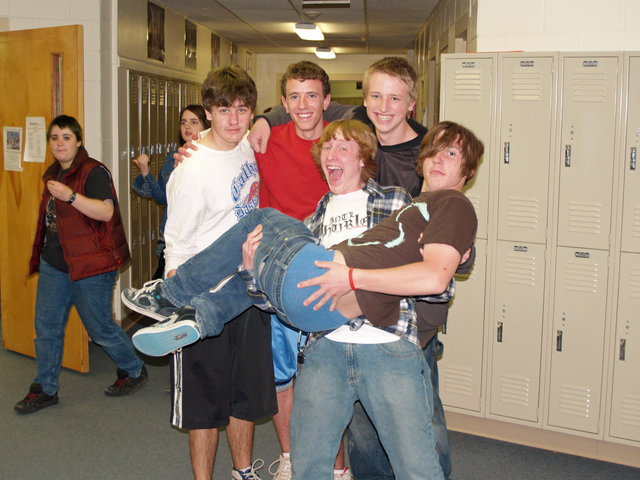 |
| A group of teenage boys. |
She’s not alone in making such observations, which have sparked spirited online debates about their implications.
“I’d seen trend pieces characterizing these trends as meaning teens were more ‘virtuous,’ when talking about declines in sex or alcohol, or that teens were ‘lazy’ when talking about declines in working,” Twenge, a professor of psychology at San Diego State University, told Seeker. “But I thought both of those missed the big picture — that teens were taking longer to grow up.”
She and her colleague Heejung Park, an assistant professor of psychology at Bryn Mawr College, decided to investigate the matter further.
They analyzed seven surveys, conducted between 1976 and 2016, of 8.3 million 13- to 19-year-olds. The surveys were nationally representative, reflecting the population of US teens in terms of gender, race/ethnicity, socioeconomic status, and geographic region.
In the surveys, teens were asked how they used their time, including their engagement in one or more activities that were considered to be adult in nature. These included dating, working for pay, going out without their parents, driving, and having sex. The massive amount of data allowed Twenge and Park to compare teens in the 2010s to teens in the 2000s, 1990s, 1980s, and 1970s.
The study, published in the journal Child Development, found that adolescents in the present decade are less likely to engage in such adult behaviors, which are mostly tied to independence from parental figures. The trend appeared across all demographic groups, and supports Twenge’s speculation that teens are growing up more slowly than their counterparts from previous decades did.
“I would not describe youths as ‘more immature,’” she said. “That doesn’t fit the larger pattern of the data. Is it more or less mature to have sex or drink alcohol in high school? It’s neither.”
Delayed development throughout the animal kingdom is usually associated with greater time for education, with humans gaining much of this in school. Less schooling does not necessarily mean less learning overall, however.
“For example, when young people on average had less educational opportunities and started working at a job or started their family at earlier ages, they were engaging in different types of learning,” Park explained. “As another example, in cultures and communities where formal schooling is less available, much learning takes place in the home setting through observations and interactions, rather than through explicit forms of teaching and communication.”
Twenge, who is the author of the book iGen: Why Today’s Super-Connected Kids Are Growing Up Less Rebellious, More Tolerant, Less Happy — and Completely Unprepared for Adulthood, noted that more people go to college now than they did in past years.
“Whether they are actually learning more is a question we can’t answer with this data,” she noted.
 |
| Three teenage girls taking a selfie. |
The decline in adult activities among teens may be linked to the time they spend online, however, since this increased markedly over the span of the surveys.
Electronic devices such as computers and smartphones “likely accelerated some of the trends in the last 10 years, as many of them involve getting out of the house, which is now less necessary for communicating with friends,” explained Twenge.
Human physical development is on a different, genetics-driven timetable than these more culturally-driven changes. Other studies even show that some youths are going through puberty earlier now than they did in past decades. This can put the bodies of adolescents and teens in conflict with societal norms.
For example, while teens may be physically able to have children of their own, others may believe that such younger individuals are not emotionally and/or financially stable enough to have offspring. These same reasons, plus health concerns, have led to the passage of laws governing other adult-associated behaviors, such as driving.
“Due to the slow life strategy,” Twenge said, “adults believe teens should grow up more slowly, and then laws are passed to restrict their access to alcohol, cigarettes, etc.”
For the study, she and Park also examined how changes in family size, life expectancy, education, and the economy may have influenced the rate at which teens engage in adult activities.
These activities were less common during time periods when families had fewer children and higher median income, and when fewer people died of communicable diseases. Longer lives on average, women giving birth at later ages, and completion of education later in life were additional factors associated with teens growing up more slowly.
“Life history theory explicitly notes that slow or fast strategies are not inherently good or bad,” Twenge noted. “They are adaptations to the cultural context.”
“Young people today are exposed to different types of learning than prior generations, due to cultural changes and humans’ tendency to adapt to the changing environmental conditions,” Park added. “Each cultural environment has strengths and weaknesses, so it is important to recognize both what’s being gained and lost as our cultures change.”
Read more at Seeker
No comments:
Post a Comment